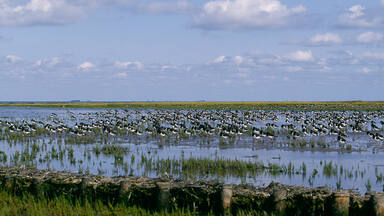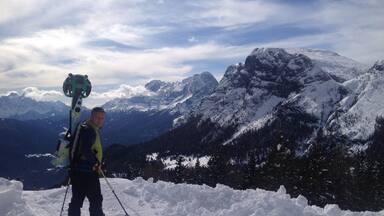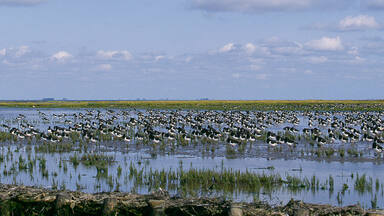The Dolomites
The Dolomites
The site of the Dolomites comprises a mountain range in the northern Italian Alps, numbering 18 peaks which rise to above 3,000 metres and cover 141,903 ha. It features some of the most beautiful mountain landscapes anywhere, with vertical walls, sheer cliffs and a high density of narrow, deep and long valleys. A serial property of nine areas that present a diversity of spectacular landscapes of international significance for geomorphology marked by steeples, pinnacles and rock walls, the site also contains glacial landforms and karst systems. It is characterized by dynamic processes with frequent landslides, floods and avalanches. The property also features one of the best examples of the preservation of Mesozoic carbonate platform systems, with fossil records.
Description is available under license CC-BY-SA IGO 3.0
Les Dolomites
La chaîne de montagnes des Dolomites, située dans le nord des Alpes italiennes, compte 18 sommets de plus de 3000 mètres. Le site couvre 141 903 ha et constitue un des plus beaux paysages de montagne du monde, caractérisé par des murailles verticales, des falaises abruptes et une forte densité de vallées très étroites, longues et profondes. Le bien comprend neuf éléments représentatifs de la diversité de ces paysages spectaculaires - pics, pinacles, murailles - qui sont d'importance internationale pour la géomorphologie. On y trouve aussi des reliefs glaciaires et des systèmes karstiques. Le tout est caractérisé par une nature dynamique avec de fréquents éboulements, inondations et avalanches. Le bien présente aussi un des meilleurs exemples de préservation de systèmes de plateformes carbonatées du Mésozoïque, incluant des registres fossilifères.
Description is available under license CC-BY-SA IGO 3.0
منطقة الدولوميت من جبال الألب
تشمل منطقة الدولوميت، التي تشكل مجموعة من الجبال تقع في شمال جبال الألب الإيطالية، 18 قمة يبلغ ارتفاع كل منها إلى ما يزيد عن 000 3 متر. وتغطي المنطقة المندرجة 141،903 هكتاراً من بين أكثر المناظر الطبيعية الجبلية روعة على الإطلاق؛ وتتميز هذه المنطقة بجدران عمودية، ومنحدرات صخرية شاهقة وعدد كبير من الأودية الضيقة والعميقة والطويلة. ويُعد هذا الموقع التراثي العالمي ممتلكاً متسلسلاً يتكون من ثماني مناطق تمثل مناظر طبيعية رائعة ومتنوعة ذات أهمية عالمية في مجال الجيومورفولوجيا، وتشمل عدداً من الأبراج، والقمم والجدران الصخرية. وتحوي هذه المنطقة أيضاً سهولاً جليدية ونظم الكارست، كما أنها كثيراً ما تتعرض لانهيال الصخور، والفيضانات والانهيارات الثلجية. وتُمثل المنطقة أيضاً أحد أبرز الأمثلة على بقاء نظم المسطحات الكربونية الخاصة بحقبة الميزوزوي، وما تحويه من شواهد أحفورية.
source: UNESCO/CPE
Description is available under license CC-BY-SA IGO 3.0
Los Dolomitas
Los Dolomitas están situados en la parte septentrional de los Alpes italianos. Esta cadena montañosa cuenta con 18 cumbres que se yerguen a más de 3.000 metros de altura. El sitio inscrito en la Lista del Patrimonio Mundial abarca 141.903 hectáreas y es uno de los paisajes de montaña más bellos del mundo, caracterizado por la presencia de paredes verticales, farallones cortados a pico y una gran densidad de valles angostos, profundos y largos. El sitio está compuesto por una serie de nueve zonas con paisajes espectaculares muy diversos que revisten una gran importancia internacional para la geomorfología, debido a sus notables agujas, cúspides y murallas rocosas. También posee relieves glaciares y sistemas kársticos. La dinámica de los procesos naturales del sitio se caracteriza por la frecuencia de los corrimientos de tierras, avalanchas e inundaciones. El sitio constituye también uno de los mejores ejemplos existentes de preservación de sistemas de plataformas carbonatadas de la Era Mesozoica con registros fosilíferos.
source: UNESCO/CPE
Description is available under license CC-BY-SA IGO 3.0
ドロミーティ
北部イタリア・アルプスのドロミーティは、標高3000m以上の山が18峰あり、14万1903haの広さを有する一連の山岳地帯である。特徴的なのは、切り立った岩壁、密集した狭く深く長い谷間など、美しい山岳景観だ。尖峰や岩壁のほかに氷河地形やカルスト地形もあり、地形学の面で国際的に重要な、多様で見応えのある景観を形づくっている。これらは、激しい地殻変動により隆起や浸食を繰り返し、たび重なる地すべりや洪水、雪崩などによってつくりだされたことを示している。さらに、この地域では、中生代のサンゴなどの生物がつくった炭酸塩プラットフォームが、その生物の化石とともに極めて良好な状態で保存されている。source: NFUAJ
Dolomieten
De Dolomieten zijn een bergketen in de Noord-Italiaanse Alpen met 18 pieken van meer dan 3.000 meter hoog. Het gebied heeft een oppervlakte van 141.903 hectare en omvat een aantal van de mooiste berglandschappen ter wereld met verticale wanden, steile kliffen en een hoog aantal smalle, diep uitgesleten dalen. De negen gebieden hebben een grote verscheidenheid aan spectaculaire landschappen die van internationale betekenis zijn voor de geomorfologie. Hieronder vallen torens, pinakels en rotswanden, maar ook gletsjers en karstsystemen, gekenmerkt door dynamische processen met frequente aardverschuivingen, overstromingen en lawines. De plek is een van de beste voorbeelden van het behoud van carbonaat-platformsystemen uit het Mesozoïcum, met fossielen.
Source: unesco.nl
Outstanding Universal Value
Brief Synthesis
The nine components of The Dolomites World Heritage property protect a series of highly distinctive mountain landscapes that are of exceptional natural beauty. Their dramatic vertical and pale coloured peaks in a variety of distinctive sculptural forms is extraordinary in a global context. This property also contains an internationally important combination of earth science values. The quantity and concentration of highly varied limestone formations is extraordinary in a global context, whilst the superbly exposed geology provides an insight into the recovery of marine life in the Triassic period, after the greatest extinction event recorded in the history of life on Earth. The sublime, monumental and colourful landscapes of the Dolomites have also long attracted hosts of travellers and a history of scientific and artistic interpretations of its values.
Criterion (vii): The Dolomites are widely regarded as being among the most attractive mountain landscapes in the world. Their intrinsic beauty derives from a variety of spectacular vertical forms such as pinnacles, spires and towers, with contrasting horizontal surfaces including ledges, crags and plateaux, all of which rise abruptly above extensive talus deposits and more gentle foothills. A great diversity of colours is provided by the contrasts between the bare pale-coloured rock surfaces and the forests and meadows below. The mountains rise as peaks with intervening ravines, in some places standing isolated but in others forming sweeping panoramas. Some of the rock cliffs here rise more than 1,500 m and are among the highest limestone walls found anywhere in the world. The distinctive scenery of the Dolomites has become the archetype of a “dolomitic landscape”. Geologist pioneers were the first to be captured by the beauty of the mountains, and their writing and subsequent painting and photography further underline the aesthetic appeal of the property.
Criterion (viii): The Dolomites are of international significance for geomorphology, as the classic site for the development of mountains in dolomitic limestone. The area presents a wide range of landforms related to erosion, tectonism and glaciation. The quantity and concentration of extremely varied limestone formations is extraordinary in a global context, including peaks, towers, pinnacles and some of the highest vertical rock walls in the world. The geological values are also of international significance, notably the evidence of Mesozoic carbonate platforms, or “fossilized atolls”, particularly in terms of the evidence they provide of the evolution of the bio-constructors after the Permian/Triassic boundary, and the preservation of the relationships between the reefs they constructed and their surrounding basins. The Dolomites also include several internationally important type sections for the stratigraphy of the Triassic Period. The scientific values of the property are also supported by the evidence of a long history of study and recognition at the international level. Taken together, the combination of geomorphological and geological values creates a property of global significance.
Integrity
The nine component parts that make up the property include all areas that are essential for maintaining the beauty of the property and all or most of the key interrelated and interdependent earth science elements in their natural relationships. The property comprises parts of a national park, several provincial nature parks and Natura 2000 sites, and a natural monument. Buffer zones have been defined for each component part to help to protect it from threats from outside its boundaries. The natural landscapes and processes that are essential to maintaining the property’s values and integrity are in a good state of conservation and largely unaffected by development.
Management and protection requirements
As a serial property, the Dolomites require an adequately resourced, inter-provincial governance arrangement that ensures all five provinces with territory in the property are bound together within a common management system, and with an agreed joint management strategy and a monitoring and reporting framework for the property as a whole. Common policies and programmes for the management of public use and the presentation of the property are also required for the property and its buffer zones. The property requires protection from tourism pressures and related infrastructure. Each of the component parts of the serial property requires its own individual management plan, providing not only for the protection and management of land use, but also the regulation and management of human activities to maintain its values, and in particular to preserve the qualities of its natural landscapes and processes, including extensive areas which still have wilderness character. Areas that are subject to more intensive visitation need to be managed to ensure visitor numbers and activities are within the capacity of the property in relation to the protection of both its values and the experience of visitors to the property. Adequate resources and staffing, and coordination between the staff teams in the different components of the property are also essential.



